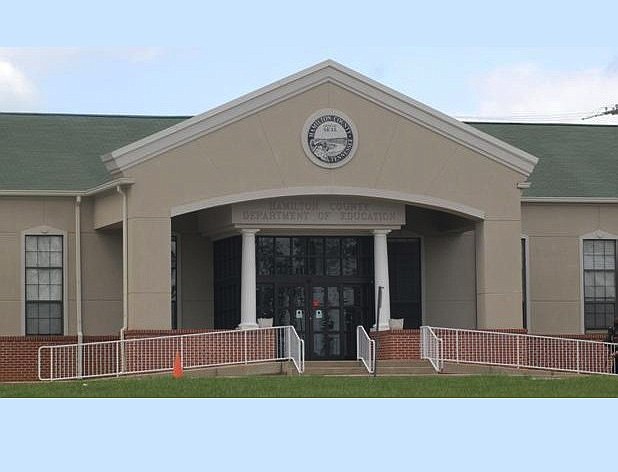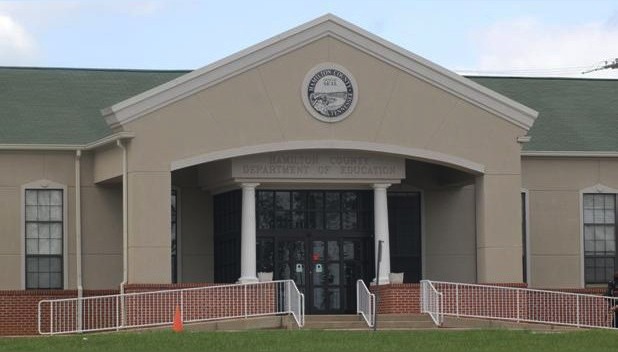A new report that calls on Tennessee to increase teachers' pay shows that the state shortchanges school districts right out of the gate.
The report says that teacher salary in Tennessee averages $50,116 a year. But when it comes to providing state funding, the state Department of Education shaves about $10,000 off that, and assumes the average teacher here earns $40,447.
According to a 2007 redo of Tennessee's Basic Education Program (BEP), the state was supposed to pay 70 percent of a teacher's salary, while the local school district picked up 30 percent.
But in Hamilton County, which is considered to be the second- or third-wealthiest county in Tennessee, the state education department factors in a "wealth index" under its formula and further reduces its contribution.
"We only get 55.9 percent, instead of 70 percent," said Christie Jordan, director of accounting and budgeting for the Hamilton County Department of Education. "They equalize it, based on our wealth index."
Long story short, the state only gives Hamilton County $22,609 per teacher, when the average salary here is $40,397. The district has to make up the rest, through such sources as local sales and property taxes.
SALARY AVERAGESAnnual teacher salaries 2013-14 (estimated)Alabama: $50,604Arkansas: $50,398Florida: $48,050Georgia: $55,420Kentucky: $53,022Louisiana: $55,342Mississippi: $43,918North Carolina: $45,355South Carolina: $51,441Tennessee: $50,355 (or $50,116 according to the Tennessee Department of Education)Virginia: $51,490West Virginia: $48,298Southeast: $50,359Source: National Education AssociationCHANGES UNDER BEP 2.0Gains and losses for area school districts if BEP 2.0 is fully fundedBradley County gains: $1,688,000Cleveland City gains: $1,215,000Etowah City gains: $29,000McMinn County gains: $356,000Dayton City gains: $67,000Meigs County gains: $19,000Polk County gains: $24,000Marion County loses: $67,000Sequatchie County gains: $25,000Rhea County gains: $45,000Bledsoe County gains: $23,000Hamilton County gains: $13,548,000Grundy County loses: $384,000Source: Basic Education Program Review Committee Annual Report
But Hamilton County could see its state funding increase by about $13 million, to $145 million, if state legislators choose to follow the recommendations issued in a 153-page annual report released Nov. 1 by the Basic Education Program Review Committee.
The committee, whose members are required by state law to include the state school officials, teachers and municipal school board members, recommends "fully funding" what's known as BEP 2.0. The revamped state school funding plan was shepherded through the Tennessee General Assembly by then-Gov. Phil Bredesen in 2007 -- but never met its funding goals because of the economic downturn shortly thereafter.
"You remember what happened in 2008 with the economy?" Jordan asked.
The committee's top two recommendations are for the state to contribute more to teachers' pay and to incorporate into the Basic Education Program the school districts' full cost for 12 months of insurance premiums, instead of the current 10 months.
"These are not new recommendations," said committee member Wayne Miller, executive director of the Tennessee Organization of School Superintendents.
The committee, which meets four times a year and issues a report annually, has made such recommendations before, Miller said -- though he couldn't say how many times.
Other recommendations would increase annual funding for teacher materials and supplies from $200 to $300; pay for an instructional technology coordinator in each school district; and provide one nurse per every 1,500 students, instead of per every 3,000.
Altogether, "fully funding" the Basic Education Program statewide would cost about $133 million, based on the $40,447 annual teachers' salary that the state acknowledges is about $10,000 too low.
However, using the actual 2014 average salary of $50,116, full funding would cost about $515 million, according to a table on page 44 of the committee's report.
Will legislators adopt the recommendations?
The committee's recommendation is just that. To take effect it would need the approval of state legislators and the signature of Gov. Bill Haslam.
That's the same Haslam who vowed at a state Capitol news conference in October 2013 to boost teachers' pay, but scuttled that in March, citing a $160 million revenue gap in sales and business tax collections.
"Teacher pay continues to be a budgeting priority for the governor," Haslam spokesman David Smith said via email.
Haslam in January appointed a special task force to look at the BEP, separate from the BEP Review Committee, and its recommendations are due by the end of the year.
"The last significant revision of the BEP was seven years ago, and education in Tennessee has changed a lot since then," Haslam said in a statement when the task force formed. "It is the appropriate time to take a fresh look at the formula, identify strengths and weaknesses and determine whether or not changes should be made."
State Sen. Todd Gardenhire, R-Chattanooga, who serves on the Senate Education Committee, said one concern he has about increasing state funding to schools is where the money goes.
"Who do we give the raise to? Do we give it to the $80,000-a-year administrator? Or do we give it to the teacher?" Gardenhire asked. "Let's don't say we're doing it for the teachers, when the teachers don't get much of it."
The $133 million required to "fully fund" the Basic Education Program also concerns Gardenhire.
"The money's got to come from somewhere," he said.
Gardenhire ruled out a tax increase.
"That's not going to happen," he said.
Some counties would lose
While the committee's proposal would increase annual funding for Hamilton County by about $13 million and Bradley County by about $1.7 million, other counties would lose money, including Grundy County, which would lose $384,000, and Marion County, which would see a $67,000 reduction.
"If fully implemented, 33 counties are going to lose over $6.8 million combined," said Samantha Bates, director of member services for the Professional Educators of Tennessee (PET).
Those school districts might band together and sue, said PET Executive Director J.C. Bowman.
Grundy County has the lowest weighted average salary in the state, at $39,607, according to the report.
"Weighted average salary helps provide an apples-to-apples comparison of pay across districts," said Tennessee Department of Education spokeswoman Ashley Ball via email. "The weighted average makes teacher experience and education levels the same for the sake of generating a number to compare across districts."
The lowest-paid teacher there, one with a bachelor's degree and no experience, earns $32,542 annually, while a teacher with a Ph.D. and 21 years' experience makes $55,655 annually, said David Dickerson, director of the Grundy County Department of Education.
"I think we're pretty much in line with the rural districts," Dickerson said. "Sometimes we struggle getting certified math and science and foreign language teachers."
Unlike larger counties that have a lot of retail and businesses that add to the tax base, Dickerson said, "We do not have a lot of industry and things like that."
He'd welcome an increase in state funding.
"I would always like to give teachers a little bit more, if we could," Dickerson said.
The state doesn't have to have a situation in which some districts win while others lose, according to Hamilton County's finance chief.
"The bottom line is education is not adequately funded," Jordan said. "Any change you make in the formula -- if you don't add money into it -- somebody's going to lose."
Contact staff writer Tim Omarzu at tomarzu@timesfreepress.com, www.facebook.com/tim.omarzu, twitter.com/TimOmarzu or 423-757-6651.

